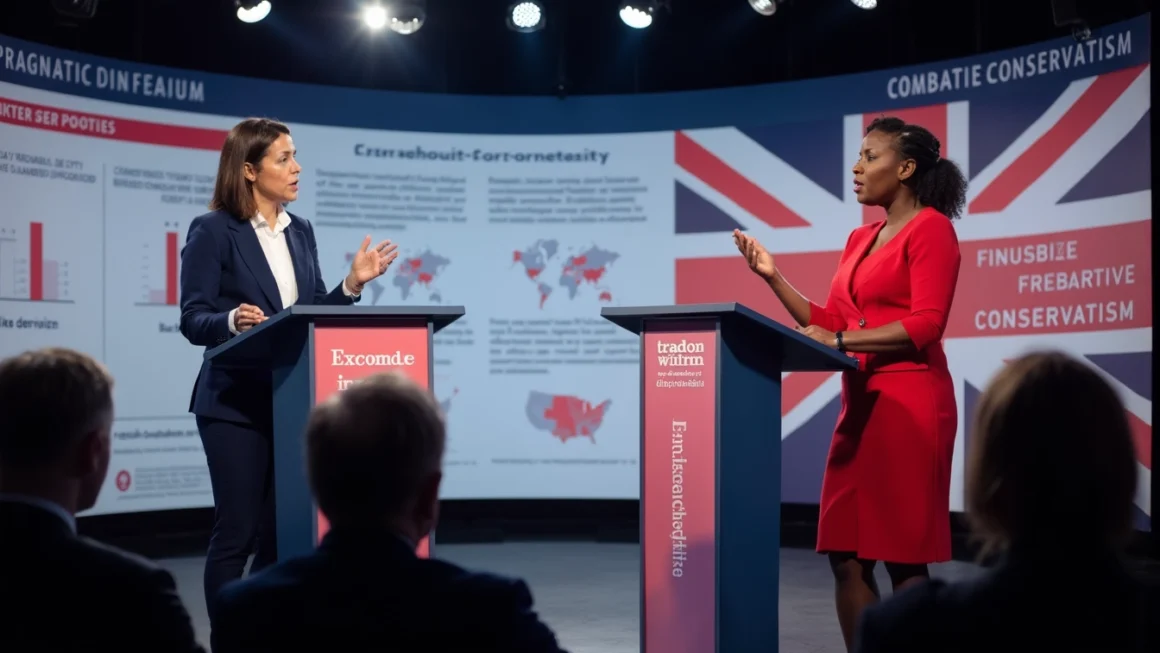The Clash of Ideologies: Rachel Reeves vs Kemi Badenoch
Table of Contents
In the ever-evolving landscape of British politics, two prominent figures have emerged as the embodiment of contrasting approaches to economic policy and cultural issues. Rachel Reeves, the shadow chancellor, and Kemi Badenoch, the business secretary, represent the battle lines being drawn in UK politics as the next general election looms on the horizon.
Rachel Reeves: The Pragmatic Economist
Rachel Reeves, a former Bank of England economist, has positioned herself as the voice of fiscal responsibility within the Labour party. Her approach to economic policy is characterized by:
- A focus on sustainable growth and investment
- Commitment to fiscal discipline
- Emphasis on evidence-based policymaking
Reeves has been instrumental in reshaping Labour’s economic narrative, distancing the party from its recent past and presenting a more centrist, business-friendly image. Her strategy involves careful messaging and a deliberate avoidance of ideological battles, preferring instead to focus on practical solutions to economic challenges.
Kemi Badenoch: The Conservative Culture Warrior
In contrast, Kemi Badenoch has emerged as a prominent voice in the Conservative party’s ongoing culture wars. Her political style is marked by:
- Outspoken criticism of “woke” ideology
- Advocacy for free-market economics
- A combative approach to social and cultural issues
Badenoch’s rise within the Conservative ranks has been meteoric, with her unapologetic stance on contentious issues earning her both ardent supporters and fierce critics. Her willingness to engage in ideological battles has made her a polarizing figure in British politics.
The Economic Battlefield
As the UK grapples with economic challenges, including inflation, sluggish growth, and the aftermath of Brexit, the contrasting approaches of Reeves and Badenoch highlight key differences in economic philosophy:
Reeves’ Pragmatic Centrism
Rachel Reeves advocates for:
- Targeted investment in key sectors
- Strengthening ties with the EU to boost trade
- Gradual, measured economic reforms
Her approach aims to reassure markets and businesses while addressing long-standing economic inequalities. Reeves has been careful to distance Labour from its previous image of fiscal irresponsibility, emphasizing the importance of balanced budgets and responsible spending.
Badenoch’s Free-Market Vision
Kemi Badenoch, on the other hand, champions:
- Deregulation and reduced government intervention
- Tax cuts to stimulate economic growth
- A more decisive break from EU regulations
Badenoch’s economic vision aligns closely with traditional Conservative free-market principles, advocating for a smaller state and greater individual and corporate freedom. She argues that this approach will unleash Britain’s entrepreneurial spirit and drive economic growth.
The Cultural Divide
Beyond economic policy, the stark contrast between Reeves and Badenoch is perhaps most evident in their approach to cultural issues:
Reeves’ Strategic Avoidance
Rachel Reeves has largely sought to sidestep cultural debates, focusing instead on:
- Economic policies and their impact on everyday lives
- Practical solutions to pressing social issues
- Building a broad coalition of support across different demographics
This approach reflects a strategic decision by Labour to avoid being drawn into polarizing cultural debates that could alienate potential voters. Automation tools and data-driven strategies are increasingly being used by political parties to fine-tune their messaging and avoid potential pitfalls in public discourse.
Badenoch’s Cultural Warrior Stance
In contrast, Kemi Badenoch has made cultural issues a central part of her political identity:
- Vocal opposition to what she perceives as “woke” ideology
- Criticism of identity politics and certain aspects of the diversity agenda
- Defense of traditional British values and institutions
Badenoch’s willingness to engage in cultural debates has endeared her to conservative voters who feel that their values are under threat from progressive ideologies. However, it has also made her a controversial figure, with critics accusing her of inflaming divisions for political gain.
The Future of British Politics
As the UK moves closer to the next general election, the contrasting approaches of Rachel Reeves and Kemi Badenoch may well define the battle lines of British politics. The outcome of this ideological clash could have far-reaching implications for:
- The direction of economic policy in post-Brexit Britain
- The role of cultural issues in shaping political discourse
- The future identity and positioning of both major parties
Voters will ultimately decide which vision resonates more strongly – Reeves’ pragmatic centrism or Badenoch’s combative conservatism. The result will not only determine the next government but also shape the long-term trajectory of British politics and society.
Conclusion
The emerging rivalry between Rachel Reeves and Kemi Badenoch represents more than just a personal or party-political contest. It embodies a fundamental debate about the future direction of the United Kingdom – economically, socially, and culturally. As the country navigates the challenges of the 21st century, the outcome of this ideological battle will play a crucial role in determining how Britain adapts to a rapidly changing world.




